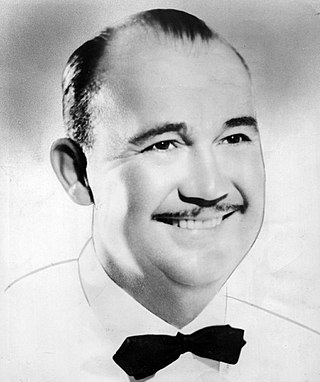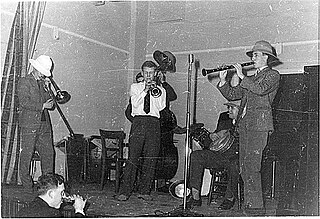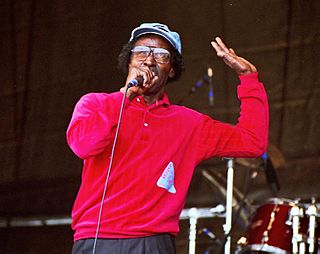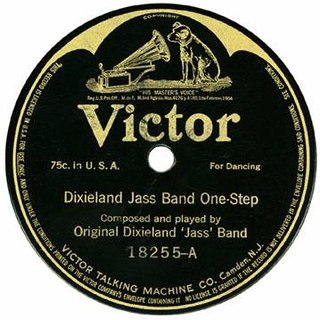Related Research Articles

The Original Dixieland Jass Band (ODJB) was a Dixieland jazz band that made the first jazz recordings in early 1917. Their "Livery Stable Blues" became the first jazz record ever issued. The group composed and recorded many jazz standards, the most famous being "Tiger Rag". In late 1917, the spelling of the band's name was changed to Original Dixieland Jazz Band.

William Christopher Handy was an American composer and musician who referred to himself as the Father of the Blues. He was one of the most influential songwriters in the United States. One of many musicians who played the distinctively American blues music, Handy did not create the blues genre but was one of the first to publish music in the blues form, thereby taking the blues from a regional music style with a limited audience to a new level of popularity.

Paul Samuel Whiteman was an American Jazz bandleader, composer, orchestral director, and violinist.

Joseph Russel Robinson was an American ragtime, dixieland, and blues pianist and composer. He was a member of the Original Dixieland Jass Band.
Jazz standards are musical compositions that are an important part of the musical repertoire of jazz musicians, in that they are widely known, performed, and recorded by jazz musicians, and widely known by listeners. There is no definitive list of jazz standards, and the list of songs deemed to be standards changes over time. Songs included in major fake book publications and jazz reference works offer a rough guide to which songs are considered standards.

David Louis Bartholomew was an American musician, bandleader, composer, arranger, and record producer. He was prominent in the music of New Orleans throughout the second half of the 20th century. Originally a trumpeter, he was active in many musical genres, including rhythm and blues, big band, swing music, rock and roll, New Orleans jazz, and Dixieland. In his induction into the Rock and Roll Hall of Fame, he was cited as a key figure in the transition from jump blues and swing to R&B and as "one of the Crescent City's greatest musicians and a true pioneer in the rock and roll revolution".

"The Saint Louis Blues" is a popular American song composed by W. C. Handy in the blues style and published in September 1914. It was one of the first blues songs to succeed as a pop song and remains a fundamental part of jazz musicians' repertoire. Benny Goodman, Louis Armstrong, Cab Calloway, Bing Crosby, Bessie Smith, Billy "Uke" Carpenter, Eartha Kitt, Count Basie, Glenn Miller, Guy Lombardo, Peanuts Hucko, Art Tatum, and the Boston Pops Orchestra are among the artists who have recorded it. The song has been called "the jazzman's Hamlet". Composer William Grant Still arranged a version of the song in 1916 while working with Handy.

Trad jazz, short for "traditional jazz", is a form of jazz in the United States and Britain that flourished from the 1930s to 1960s, based on the earlier New Orleans Dixieland jazz style. Prominent English trad jazz musicians such as Chris Barber, Freddy Randall, Acker Bilk, Kenny Ball, Ken Colyer and Monty Sunshine performed a populist repertoire that also included jazz versions of pop songs and nursery rhymes.

Laten John Adams Jr., was an American blues, jazz and gospel singer, known as "The Tan Canary" for the multi-octave range of his singing voice, his swooping vocal mannerisms and falsetto. His biggest hits were his versions of "Release Me" and "Reconsider Me" in the late 1960s.

"Tiger Rag" is a jazz standard that was recorded and copyrighted by the Original Dixieland Jass Band in 1917. It is one of the most recorded jazz compositions. In 2003, the 1918 recording of "Tiger Rag" was entered into the U.S. Library of Congress National Recording Registry.

"The Way You Look To-night" is a song from the film Swing Time that was performed by Fred Astaire and composed by Jerome Kern with lyrics written by Dorothy Fields. It won the Academy Award for Best Original Song in 1936. Fields remarked, "The first time Jerry played that melody for me I went out and started to cry. The release absolutely killed me. I couldn't stop, it was so beautiful."

"Weary Blues" is a 1915 tune by Artie Matthews.

"Basin Street Blues" is a song often performed by Dixieland jazz bands, written by Spencer Williams in 1928 and recorded that year by Louis Armstrong. The verse with the lyric "Won't you come along with me / To the Mississippi..." was later added by Glenn Miller and Jack Teagarden.
"I've Found a New Baby", also known as "I Found a New Baby", is a popular song written by Jack Palmer and Spencer Williams. It was introduced by Clarence Williams' Blue Five in 1926 and has since been recorded by many artists, making it a popular jazz standard. Popular versions in 1926 were by Ted Lewis and by Ethel Waters.

"Margie", also known as "My Little Margie", is a 1920 popular song composed in collaboration by vaudeville performer and pianist Con Conrad and ragtime pianist J. Russel Robinson, a member of the Original Dixieland Jazz Band. Lyrics were written by Benny Davis, a vaudeville performer and songwriter. The song was introduced by the Original Dixieland Jazz Band in 1920 as Victor 78, 18717-A, in a medley paired with "Singin' the Blues". The B side was "Palesteena". The ODJB recorded their instrumental version on December 1, 1920.

"Livery Stable Blues" is a jazz composition copyrighted by Ray Lopez and Alcide Nunez in 1917. It was recorded by the Original Dixieland Jass Band on February 26, 1917, and, with the A side "Dixieland Jass Band One-Step" or "Dixie Jass Band One-Step", became widely acknowledged as the first jazz recording commercially released. It was recorded by the Victor Talking Machine Company in New York City at its studio at 46 West 38th Street on the 12th floor – the top floor.
Dixieland jazz, also referred to as traditional jazz, hot jazz, or simply Dixieland, is a style of jazz based on the music that developed in New Orleans at the start of the 20th century. The 1917 recordings by the Original Dixieland Jass Band fostered awareness of this new style of music.

"Dixieland Jazz Band One-Step" also known as "Dixie Jass Band One-Step" and "Original Dixieland One-Step" is a 1917 jazz composition by the Original Dixieland Jass Band released as an instrumental on a 78rpm record, issued by the Victor Talking Machine Company. The song is a jazz milestone as the first commercially released "jass" or jazz song.
References
- ↑ Palmer, Robert (1979). A Tale of Two Cities: Memphis Rock and New Orleans Roll. Institute for Studies in American Music, Department of Music, School of Performing Arts, Brooklyn College of the City University of New York. ISBN 978-0-914678-12-0.
- ↑ Scarborough, Dorothy. "Coffee in the Gourd: The Blues As Folk-Songs, by Dorothy Scarborough". Sacred Texts. Retrieved 30 June 2013.
- ↑ Dance, Daryl Cumber, ed. (2002). From my people: 400 years of African American folklore (1st ed.). New York: Norton. p. 116. ISBN 0393047989. OCLC 47922828.
- ↑ Catalog of Copyright Entries 1921 (1 ed.). United States Copyright Office. 1921. p. 204.
- ↑ Whitburn, Joel (1986). Joel Whitburn's Pop Memories 1890-1954. Menomonee Falls, Wisconsin: Record Research Inc. p. 396. ISBN 0-89820-083-0.
- ↑ Newhart, Sally (2013). The Original Tuxedo Jazz Band: More Than a Century of a New Orleans Icon. Arcadia Publishing. p. 149. ISBN 978-1-62584-085-1.
- ↑ Martin, Henry; Waters, Keith (2011). Jazz: The First 100 Years. Cengage Learning. p. 70. ISBN 978-1-4390-8333-8.